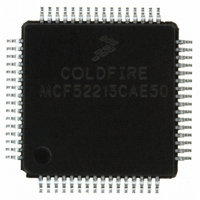MCF52213CAE50 Freescale Semiconductor, MCF52213CAE50 Datasheet - Page 20

MCF52213CAE50
Manufacturer Part Number
MCF52213CAE50
Description
IC MCU 32BIT 128K FLASH 64-LQFP
Manufacturer
Freescale Semiconductor
Series
MCF5221xr
Datasheet
1.MCF52213CAE50.pdf
(56 pages)
Specifications of MCF52213CAE50
Core Processor
Coldfire V2
Core Size
32-Bit
Speed
50MHz
Connectivity
I²C, SPI, UART/USART, USB OTG
Peripherals
DMA, LVD, POR, PWM, WDT
Number Of I /o
56
Program Memory Size
128KB (128K x 8)
Program Memory Type
FLASH
Ram Size
8K x 8
Voltage - Supply (vcc/vdd)
3 V ~ 3.6 V
Data Converters
A/D 8x12b
Oscillator Type
Internal
Operating Temperature
-40°C ~ 85°C
Package / Case
64-LQFP
Processor Series
MCF522x
Core
ColdFire V2
Data Bus Width
32 bit
Data Ram Size
8 KB
Interface Type
I2C, QSPI, UART
Maximum Clock Frequency
50 MHz
Number Of Programmable I/os
43
Number Of Timers
18
Maximum Operating Temperature
+ 85 C
Mounting Style
SMD/SMT
3rd Party Development Tools
JLINK-CF-BDM26, EWCF
Development Tools By Supplier
M52210DEMO, M52211EVB
Minimum Operating Temperature
- 40 C
On-chip Adc
12 bit, 8 Channel
A/d Bit Size
12 bit
A/d Channels Available
8
Height
1.4 mm
Length
10 mm
Supply Voltage (max)
3.6 V
Supply Voltage (min)
3 V
Width
10 mm
For Use With
M52210DEMO - BOARD DEV MCF5221X LOW COST
Lead Free Status / RoHS Status
Lead free / RoHS Compliant
Eeprom Size
-
Lead Free Status / Rohs Status
Details
Available stocks
Company
Part Number
Manufacturer
Quantity
Price
Company:
Part Number:
MCF52213CAE50
Manufacturer:
Freescale Semiconductor
Quantity:
10 000
1
2
3
4
5
6
7
8
9
10
The PDSR and PSSR registers are described in the General Purpose I/O chapter. All programmable signals default to 2 mA drive and FAST slew rate in
All signals have a pull-up in GPIO mode.
These signals are multiplexed on other pins.
For primary and GPIO functions only.
Only when JTAG mode is enabled.
CLKMOD0 and CLKMOD1 have internal pull-down resistors; however, the use of external resistors is very strongly recommended.
When these pins are configured for USB signals, they should use the USB transceiver’s internal pull-up/pull-down resistors (see the description of the
OTG_CTRL register). If these pins are not configured for USB signals, each pin should be pulled down externally using a 10 k resistor.
For secondary and GPIO functions only.
RSTI has an internal pull-up resistor; however, the use of an external resistor is very strongly recommended.
For GPIO function. Primary Function has pull-up control within the GPT module.
normal (single-chip) mode.
UART 1
UART 2
VSTBY
Group
USB
VDD
VSS
Pin
Function
VDDUSB
USB_DM
VSSUSB
USB_DP
Primary
UCTS1
URXD1
UTXD1
UCTS2
URXD2
UTXD2
VSTBY
URTS1
URTS2
VDD
VSS
Secondary
Function
SYNCA
SYNCB
—
—
—
—
—
—
—
—
—
—
—
—
—
Table 3. Pin Functions by Primary and Alternate Purpose (continued)
Function
Tertiary
URXD2
UTXD2
—
—
—
—
—
—
—
—
—
—
—
—
—
Quaternary
Function
GPIO
GPIO
GPIO
GPIO
GPIO
GPIO
GPIO
GPIO
—
—
—
—
—
—
—
Strength /
PDSR[15]
PDSR[14]
PDSR[13]
PDSR[12]
PDSR[27]
PDSR[26]
PDSR[25]
PDSR[24]
Control
Drive
N/A
N/A
N/A
N/A
N/A
N/A
N/A
1
Slew Rate /
PSRR[15]
PSRR[14]
PSRR[13]
PSRR[12]
PSRR[27]
PSRR[26]
PSRR[25]
PSRR[24]
Control
N/A
N/A
N/A
N/A
N/A
N/A
N/A
1
Pull-down
Pull-up /
—
—
—
—
—
—
—
—
—
—
—
—
—
—
—
2
3,15,24,25,3
57,68,81,93
67,75,82,92
100 LQFP
1,2,14,22,
23,34,41,
5,42,56,
Pin on
100
98
99
27
30
28
29
55
62
59
61
60
4
A1,A9,D4,D
D5,E3–E7,
6,F4,F6,J1
Pin on 81
MAPBGA
C3
B1
B2
A2
D8
D9
E9
F8
F7
F5
—
—
—
—
1,10,20,39,5
LQFP/QFN
Pin on 64
11,21,38,
53,64
61
63
62
—
—
—
—
37
43
40
42
41
2
2











